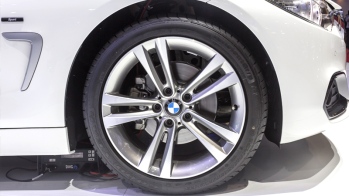We all know that design is one of the key features that car manufacturers focus on to build their brands and develop a loyal customer base. This is particularly true of premium car brands.
Of course, the value of high-end design makes a tempting target for manufacturers and sellers for after-sales parts. This has brought them into conflict with car manufacturers who, naturally, want to protect their intellectual property.
This was the issue at the heart of a recent dispute between BMW and an importer and seller of replica rims.
Copies Cause a Tug of War
 BMW has protected the design of its rims on the EU-level by registering them as Community Designs. When BMW became aware of the replica rims, BMW took action against them.
BMW has protected the design of its rims on the EU-level by registering them as Community Designs. When BMW became aware of the replica rims, BMW took action against them.
The importer of the replica rims argued that the rims were legal, because they were covered by Article 110(1) of the Community Designs Regulation known as the spare parts exception. This exception essentially states that the owner of a Community Design cannot prevent other parties from manufacturing and selling spare parts.
Given that the regulation is a political compromise that leaves the definition of what exactly is considered a spare part somewhat unclear, the ground was set for the dispute.
Replica Rims Are Not Spare Parts
The scope of the spare part exception has been contested throughout Europe over the past years in various proceedings, typically between car manufacturers and spare part producers or their retailers.
In this Finnish case, the key arguments revolved around a part of the wording of the exception that states that for the exception to apply, the part must be used ‘for the purpose of the repair of [a] complex product so as to restore its original appearance’. In this case, the complex product was a car.
The Helsinki District Court found that rims are not used to ‘restore the original appearance’ of a car, but to improve or modify it. This being the case, the replica rims were not considered spare parts and not protected by the exception.
Rims Alter, Nor Restore, a Car’s Appearance
In its reasoning, the Court compared rims to a front wing of a car. In the Court’s view, a spare part front wing must be identical with the one being replaced, but aluminium rims are used to give the car a different, typically more trendy, appearance.
From a legal perspective, the District Court followed the dominant approach in European case law, citing the recent ruling of the Danish Supreme Court from 10 March 2015 and the well-known decision of the UK High Court in BMW v Round and Metal from 2012 in support of its reasoning
More Certainty for Design Rights Holders
Even though the decision is in line with European case law, it remains precedent setting in Finland. Owners of Community Designs now have more certainty when seeking to intervene in the sale of replica rims in Finland.
If you’re interested in Community design rights, the spare part exception and perhaps EU trade mark law, you should have a look at the recent decision of the Court of Justice of the European Union (CJEU) in Ford Motor Company vs Wheeltrims Srl (C-500/14). In that case the CJEU, responding to a preliminary reference, held, some might say unsurprisingly, that the spare part exception under Article 110(1) does not provide a defence to an alleged trademark infringement.
Full disclaimer: we acted for BMW in the dispute.


 State clearly and unambiguously in your sub-contracting, employee, management and shareholder agreements that the title to IP is transferred to the company. Licensing or buying the rights later on may turn out to be costly and difficult.
State clearly and unambiguously in your sub-contracting, employee, management and shareholder agreements that the title to IP is transferred to the company. Licensing or buying the rights later on may turn out to be costly and difficult.